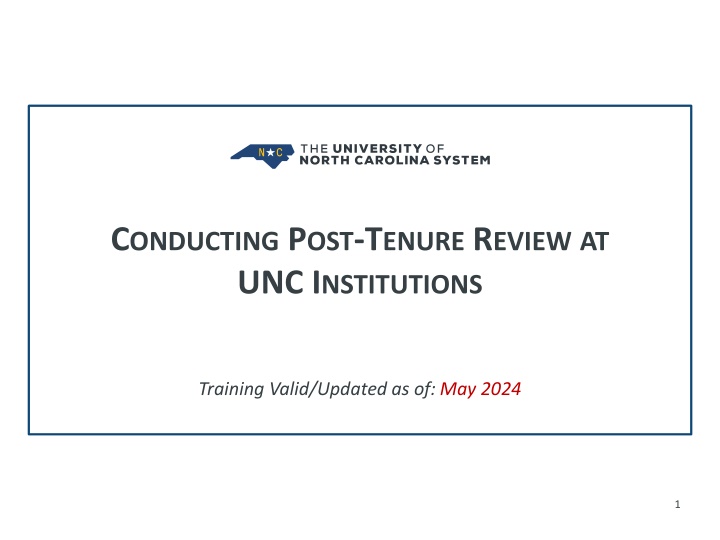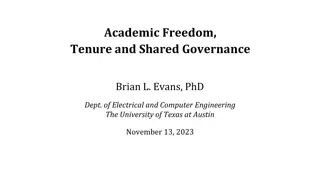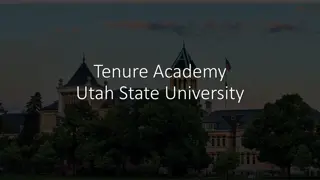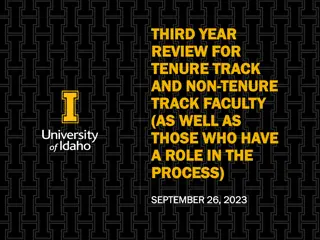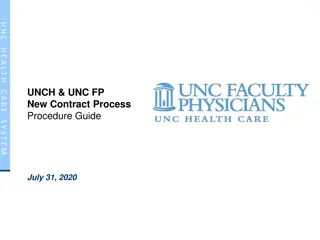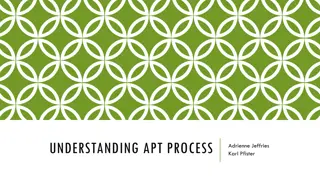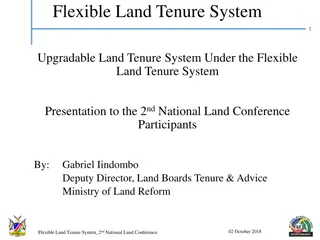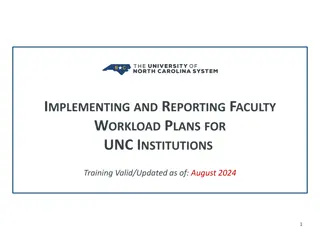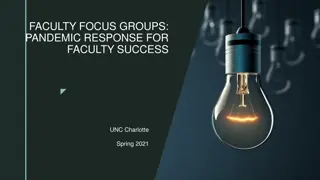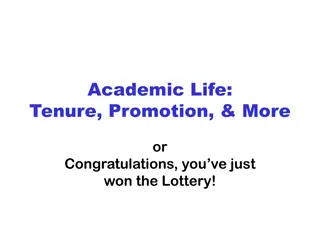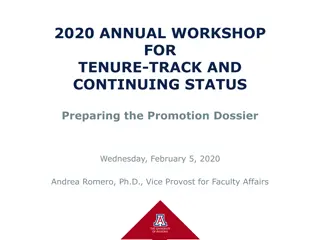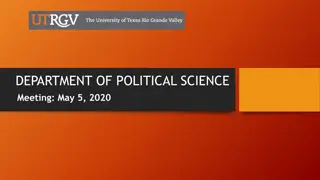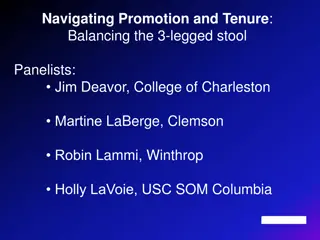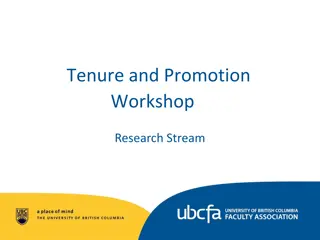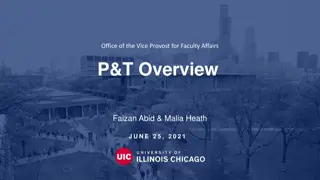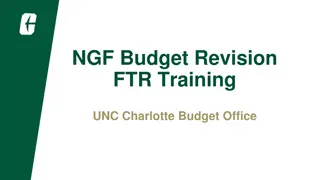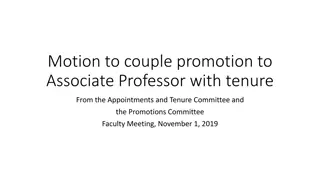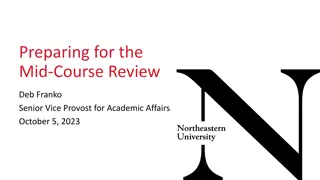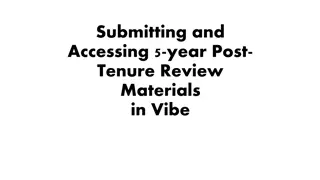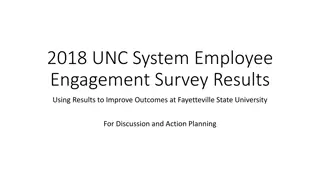UNC Post-Tenure Review Training Overview
This training provides essential guidance for the Post-Tenure Review (PTR) process at UNC Institutions, aimed at assessing faculty in teaching, research, and service roles. Covering PTR purpose, scope, cycle, and outcomes, it emphasizes excellence, performance expectations, rewards, and sanctions for faculty members. The evaluation components and committee formation are detailed, supporting faculty success plans as needed.
Download Presentation

Please find below an Image/Link to download the presentation.
The content on the website is provided AS IS for your information and personal use only. It may not be sold, licensed, or shared on other websites without obtaining consent from the author.If you encounter any issues during the download, it is possible that the publisher has removed the file from their server.
You are allowed to download the files provided on this website for personal or commercial use, subject to the condition that they are used lawfully. All files are the property of their respective owners.
The content on the website is provided AS IS for your information and personal use only. It may not be sold, licensed, or shared on other websites without obtaining consent from the author.
E N D
Presentation Transcript
CONDUCTING POST-TENURE REVIEW AT UNC INSTITUTIONS Training Valid/Updated as of: May 2024 1
OBJECTIVEAND OVERVIEW Objective: To promote well-informed participation in the process for systematically and consistently assessing faculty in their essential and valued role across the University in teaching, research/creative activity, and service. Training is based upon UNC Policy 400.3.3, Performance Review of Tenured Faculty (Post-Tenure Review), and 400.3.3.1[R], Regulation on Performance Review of Tenured Faculty (Post-Tenure Review) o Even if you have seen these previously, because both underwent extensive changes in 2024 o Previous Guidelines on PTR were superseded by the new Regulation Training is required for all participants in the PTR process 2
TRAINING OVERVIEW 1. PTR Purpose 2. PTR Scope, Cycle, and Outcomes 3. PTR Processes Long-Term Work Plan a. Evaluation Elements b. PTR Evaluation Committee Formation and Outcomes c. Administrative Evaluation (Department Chair/Academic Unit Head) d. Dean s Evaluation e. 4. Faculty Success Plan (if needed for Does Not Meet Expectations) 3
PTR PURPOSE Purpose: To support and encourage excellence among tenured faculty at University of North Carolina constituent institutions. o Assist faculty in meeting performance expectations o Recognize and reward exemplary performance o Provide for imposition of appropriate sanctions when faculty members do not meet their faculty plan goals Each institution shall adopt and maintain policies and procedures for PTR o Consistent with UNC Policy and o Reflective of the individual mission, purpose, and operation of our very different institutions 4
PTR SCOPE Scope: PTR shall evaluate all aspects of the professional performance of tenured faculty members. Conducted every five years after awarding of tenure Clinical and extension faculty are exempt from PTR Deans, department chairs, and academic unit heads o Exempt if duties >0.50 FTE while occupying administrative position o Due five years after return to faculty duties 5
PTR SCOPEAND CYCLE Evaluations shall be based upon the faculty member s long- term work plan, with input from annual work plan See UNC Policy 400.3.4, Policy on Faculty Workload, Section II. B, and UNC Policy 400.3.4[R], Regulation on Faculty Workload, Section IV START: Tenure Granted or post-PTR Restart The PTR/Evaluation Cycle: Create Long-Term Work Plan (concurrent with PTR cycle start/restart) Any Annual Work Plans and Evaluations Applicable Post-PTR Actions Post- Tenure Review (5-year point) 6
PTR SCOPE OUTCOMES Three assessment categories: o Exceeds Expectations: consistently and considerably surpasses established goals o Meets Expectations: consistently achieves and may occasionally surpass established goals o Does Not Meet Expectations: does not consistently achieve established goals Dean s Evaluation is the final, recorded assessment o Exceeds Expectations reviewed by CAO for recognition/reward o CAO reports institutional totals & percentages to the UNC System Office annually 7
PTR PROCESSES LONG-TERM WORK PLAN Each institution shall develop and publish procedures/guidance as well as format and requirements Long-term work plans shall cover the five years of the post- tenure cycle These plans kick off the PTR process and shall be coordinated with the annual workload plans (see Faculty Workload policy and regulations) and evaluations Approved by the college/school dean (or appropriate next- level supervisor) MAY be modified during the five years, dictated by changes and circumstances, with proper documentation and same approvals as original plan 8
PTR PROCESSES EVALUATION ELEMENTS Faculty member s self evaluation o In addition to other materials (specified by institutional policies) o Allows the faculty member to offer information and perspective o Institutions shall design and define the specific format, length, and required information Post-Tenure Evaluation Committee of faculty peers Department chair/unit head evaluation Dean s evaluation 9
PTR PROCESSES PT EVALUATION COMMITTEE Selection/Formation o Should be guided/informed by institutional policies, but o Include a process agreed upon by the tenured faculty of the faculty member s academic unit o Faculty member under review cannot select members of their evaluation committee Composition o No less than 3 tenured faculty members from the department/unit o If not enough available, and/or no other expert in the field of activity of faculty member under review: Institutions should establish a process for requesting external faculty experts in the same field Faculty experts within the UNC System preferred, but if none available can be from other institutions 10
PTR PROCESSES PT EVALUATION COMMITTEE OUTCOMES Evaluation Committee will provide a brief, written assessment o In accordance with faculty member s long-term work plan and allocation of duties, and o Based upon an assessment of faculty member in each relevant category of teaching, research/creative activity, and service The committee shall provide an overall ranking of Exceeds Expectations, Meets Expectations, or Does Not Meet Expectations o Exceeds Expectations shall include statements and descriptions of specific primary responsibilities and how the faculty member exceeded assigned duties and established goals o Does Not Meet Expectations shall include statements and descriptions of specific shortcomings as related to assigned duties and established goals 11
PTR PROCESSES ADMINISTRATIVE EVALUATIONS Department chair/academic unit head o Provides a separate, written evaluation o Explicitly state points of concurrence or points of variation from the post- tenure evaluation committee o Recommendation for performance recognition (Exceeds Expectations) or for a faculty success plan (for Does Not Meet Expectations) must include specific rationale and explanations Faculty Member shall have at least 14 calendar days to review Evaluation Committee and dept chair/academic unit head evaluations o If any disagreement with evaluations, faculty member may provide a written response to the dept chair/academic unit head, with specific evidence, in support of a different assessment o The response will become part of the permanent review record, and available to the dean for the final assessment 12
PTR PROCESSES DEANS EVALUATION Dean shall provide a written evaluation/review and assessment category based on: o Faculty member s materials and self-evaluation o Post-tenure Evaluation Committee review report o Department chair/academic unit head evaluation o If applicable, written response from faculty member Overall rating of Exceeds Expectations completes the process o Institutions shall create processes to forward recommendations for those Exceeding Expectations to the CAO for recognition/rewards o Institutional policies shall indicate how the names are advanced, types of recognition and/or reward are available and how they will be bestowed Overall rating of Meets Expectations completes the process Overall rating of Does Not Meet Expectations begins Faculty Success Plan process 13
PTR PROCESSES FACULTY SUCCESS PLANS Faculty Success Plans shall be Formative o Developed in coordination with the faculty member o Designed, with specific steps, for improvement in specific areas noted in the PTR evaluations o Institutions shall specify timelines for the Faculty Success Plans, but the plans shall be at least one year from the date of implementation to the conclusion may be longer, depending on the noted areas of improvement o Must include a clear statement of consequences, in accordance with Chapter VI of The Code, should improvement not occur within the timeline Meetings and included personnel: o Peer mentoring strongly encouraged o Progress meetings are mandatory with dept chair/academic unit head at least semi-annually 14
PTR PROCESSES FACULTY SUCCESS PLANS Considerations for faculty with Faculty Success Plans o MAY include redefining faculty workloads (long-term plan and/or annual workload plan) o May reconsider workloads and distribution of teaching, research/creative activity, and service Neither Faculty Success Plans nor changes to faculty workloads shall be punitive o Should address ways for the faculty member to leverage the expertise and abilities to improve performance o Department chair/academic unit head are responsible for ensuring these efforts o Peer mentoring strongly encouraged o Progress meetings are mandatory with dept chair/academic unit head at least semi-annually 15
CONCLUSION The PTR process is designed to support and encourage faculty excellence New UNC System policies, regulations, and the PTR processes are integrated and holistic o Faculty Workload guidance informs the o Long-Term Plans, which then inform/help create the o Annual Workload Plans, which are assessed by the o Annual Evaluations, which should build and Can inform and cause tweaks to the Long-Term Plans and/or the next Annual Workload Plan thus There should be no surprises when it is time for o Post-Tenure Review Institutions design and implement policies and processes reflective of their missions and faculty 16
THANK YOU www.northcarolina.edu @uncsystem @UNC_System
